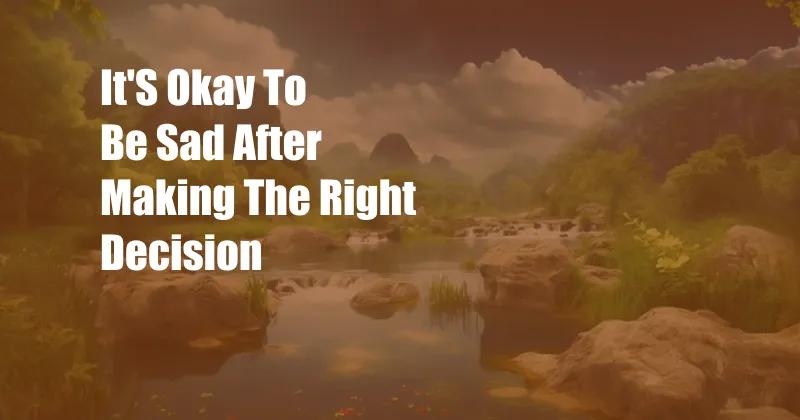
It’s Okay to Be Sad After Making the Right Decision
Life is full of choices, and sometimes, the right decision can leave us feeling surprisingly heavy-hearted. We may question our choice, wonder if we’ve made a mistake, or even feel guilty for choosing our own happiness.
Sadness and the Power of Choice
It’s important to acknowledge that sadness following a difficult decision is a normal and human response. Our emotions are complex, and even the most well-thought-out decisions can trigger unexpected feelings. Sadness can stem from the realization of what we’ve left behind, the fear of the unknown, or the weight of responsibility that has shifted onto our shoulders.
Understanding the Emotional Rollercoaster
1. Recognizing the Loss
Every decision, right or wrong, involves a degree of loss. We may lose a familiar path, a comforting relationship, or a cherished dream. Recognizing and grieving this loss is crucial for healing and acceptance.
2. Fear of the Unknown
Embarking on a new path often brings with it a sense of uncertainty and anxiety. We may fear the unknown, worry about our capabilities, or doubt our readiness. These fears can contribute to feelings of sadness and insecurity.
3. Responsibility and Pressure
Significant decisions often come with increased responsibility and pressure. The weight of our choices can weigh heavily on our minds, making us question our abilities and whether we’re up to the task.
Tips for Navigating the Emotional Impact
1. Allow Yourself to Feel
Suppressing sadness only prolongs the healing process. Acknowledge your emotions, give yourself permission to cry, and talk to a trusted friend or therapist about your feelings.
2. Practice Self-Compassion
Be kind to yourself. Remember that making difficult decisions is part of life and that everyone experiences periods of sadness. Forgive yourself for any missteps and focus on learning from the experience.
3. Reframe Your Perspective
Instead of dwelling on the sadness, try to reframe your perspective. Focus on the positive aspects of your decision, the opportunities it presents, and the growth it will bring. Remember, the sadness is temporary, but the benefits of your choice can last a lifetime.
4. Seek Support
Talking to loved ones, joining support groups, or seeking professional help can provide a safe space to process your emotions and gain insights from others who have faced similar challenges.
5. Practice Mindfulness
Pay attention to your thoughts and feelings without judgment. Mindfulness helps us become aware of our emotions, accept them, and move through them without getting overwhelmed.
FAQ
Q: Is it normal to feel sad after making a difficult decision?
A: Yes, it’s a common and understandable response to the emotional rollercoaster that accompanies significant choices.
Q: How long does it typically take to feel better after making a difficult decision?
A: The duration of sadness varies depending on the individual and the weight of the decision. It’s important to allow yourself time to heal and process your emotions fully.
Q: What are some signs that I need professional help?
A: If your sadness persists or intensifies, interferes with your daily life, or leads to thoughts of self-harm, it’s essential to seek professional help.
Conclusion
Making the right decision doesn’t always feel easy or painless. Sadness is a natural part of the process, and it’s crucial to allow yourself to experience it while seeking support and reframing your perspective. Remember, the journey of growth and fulfillment often begins with a step into the unknown, and even the most well-calculated choices can bring a new set of challenges and emotions. Are you interested in this topic? Let us know in the comments below!